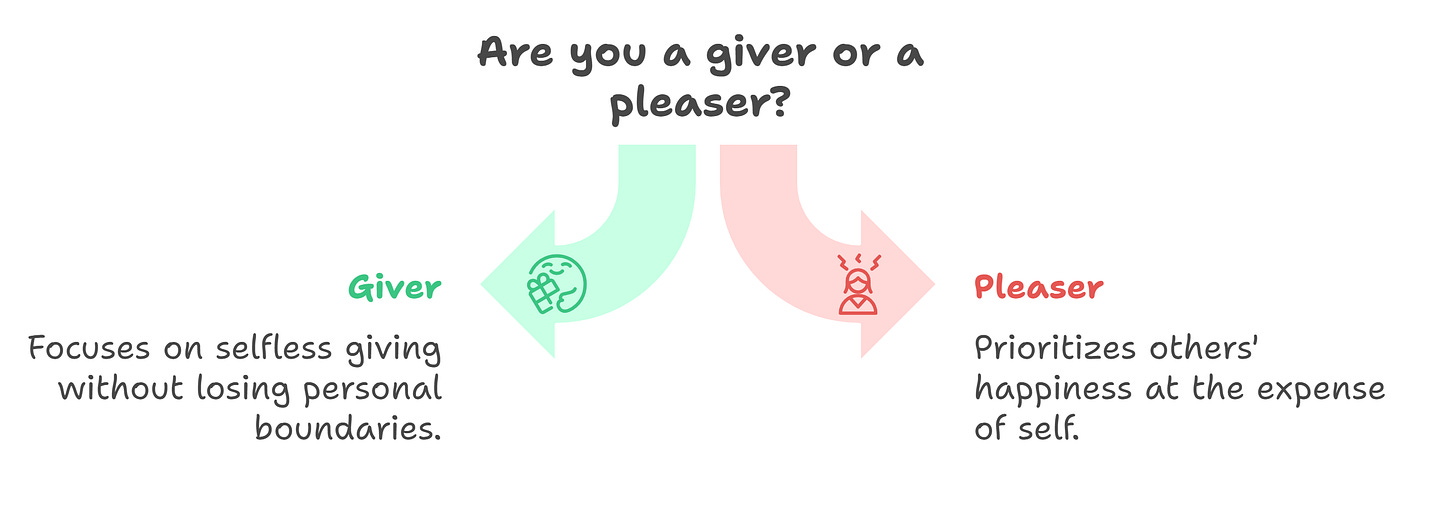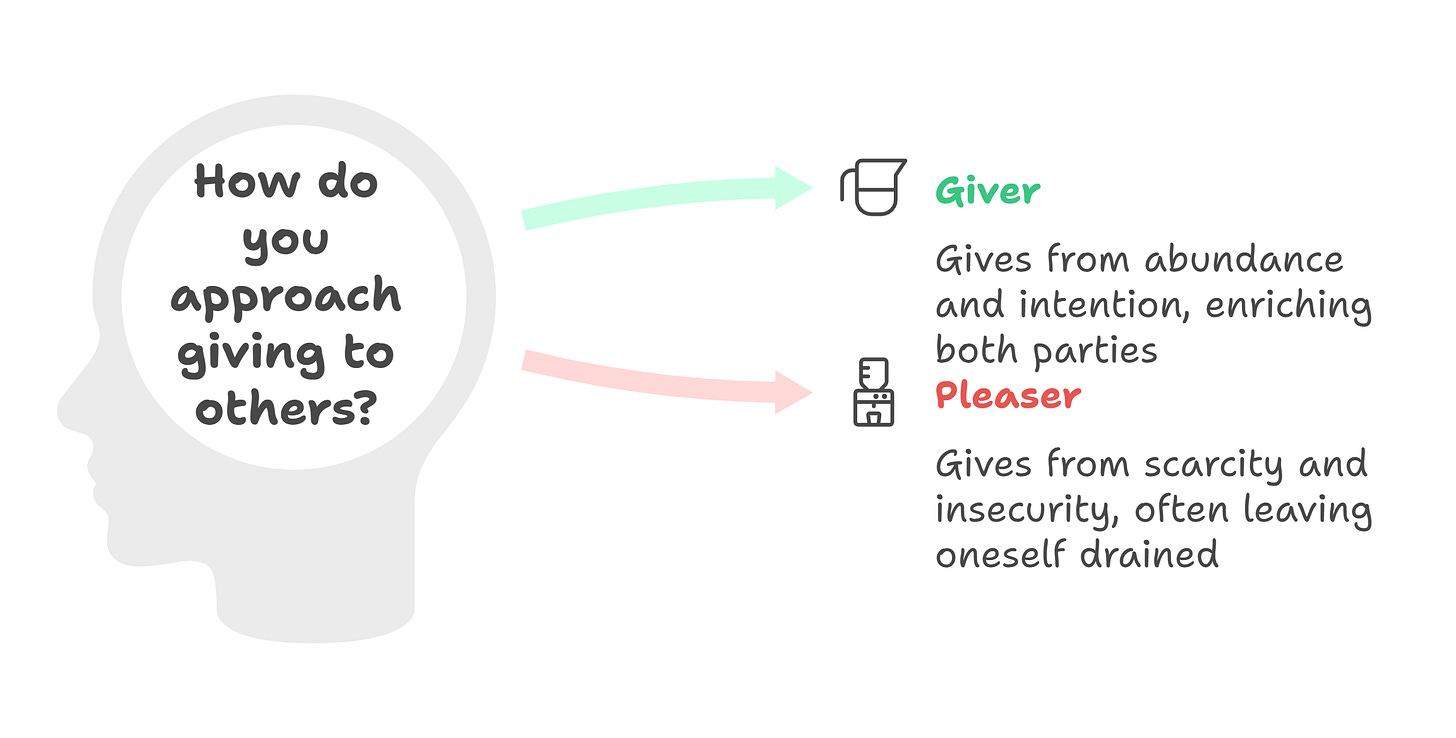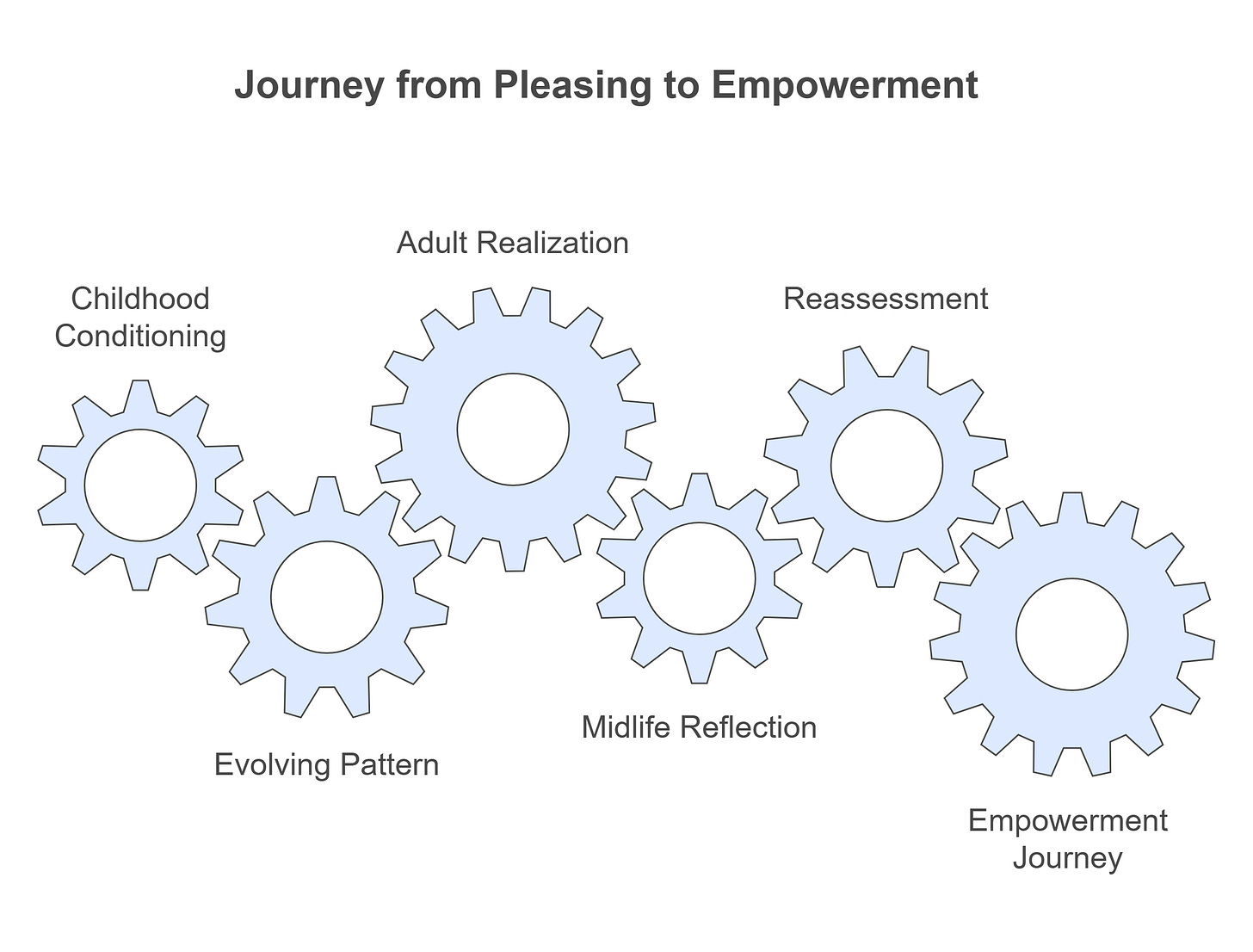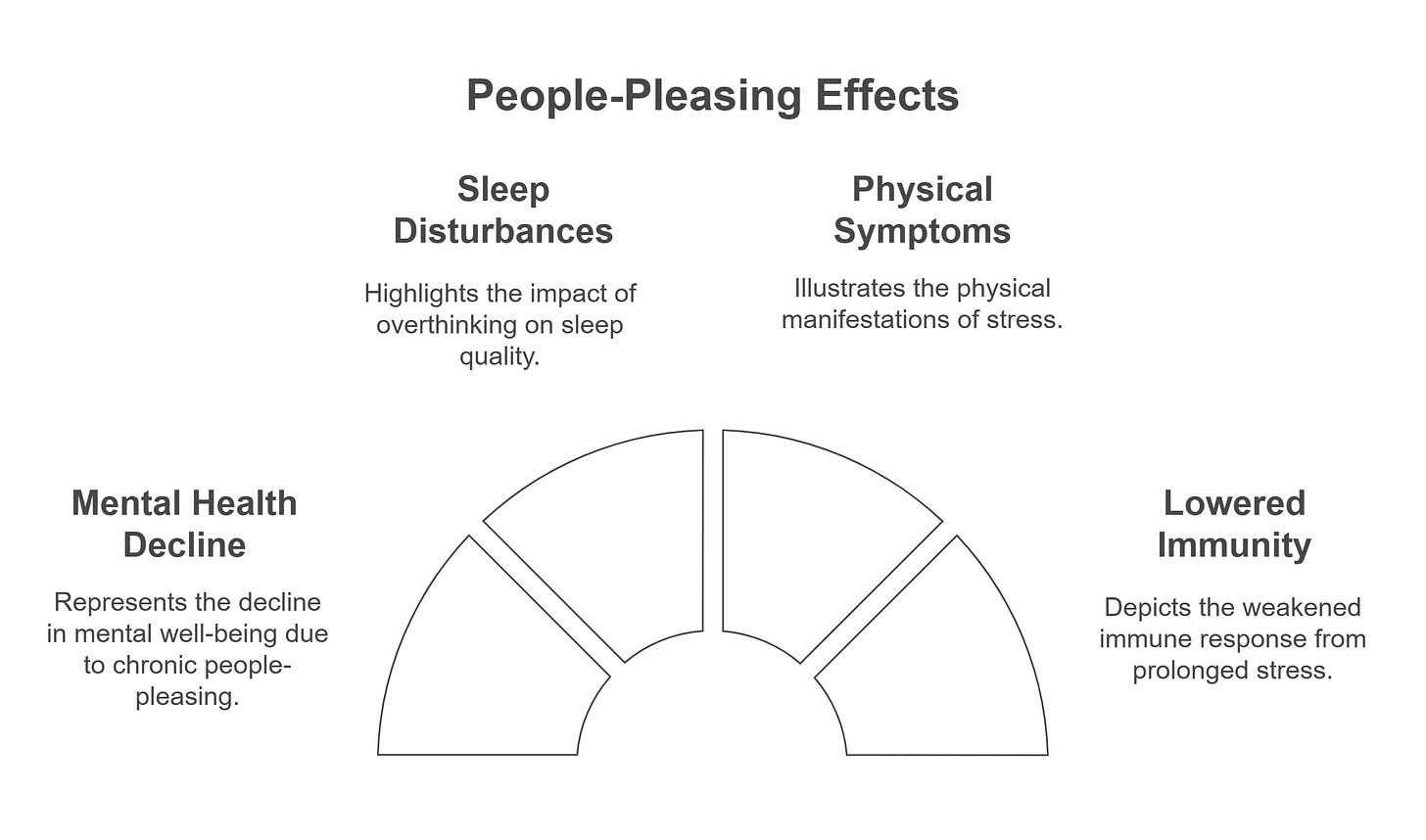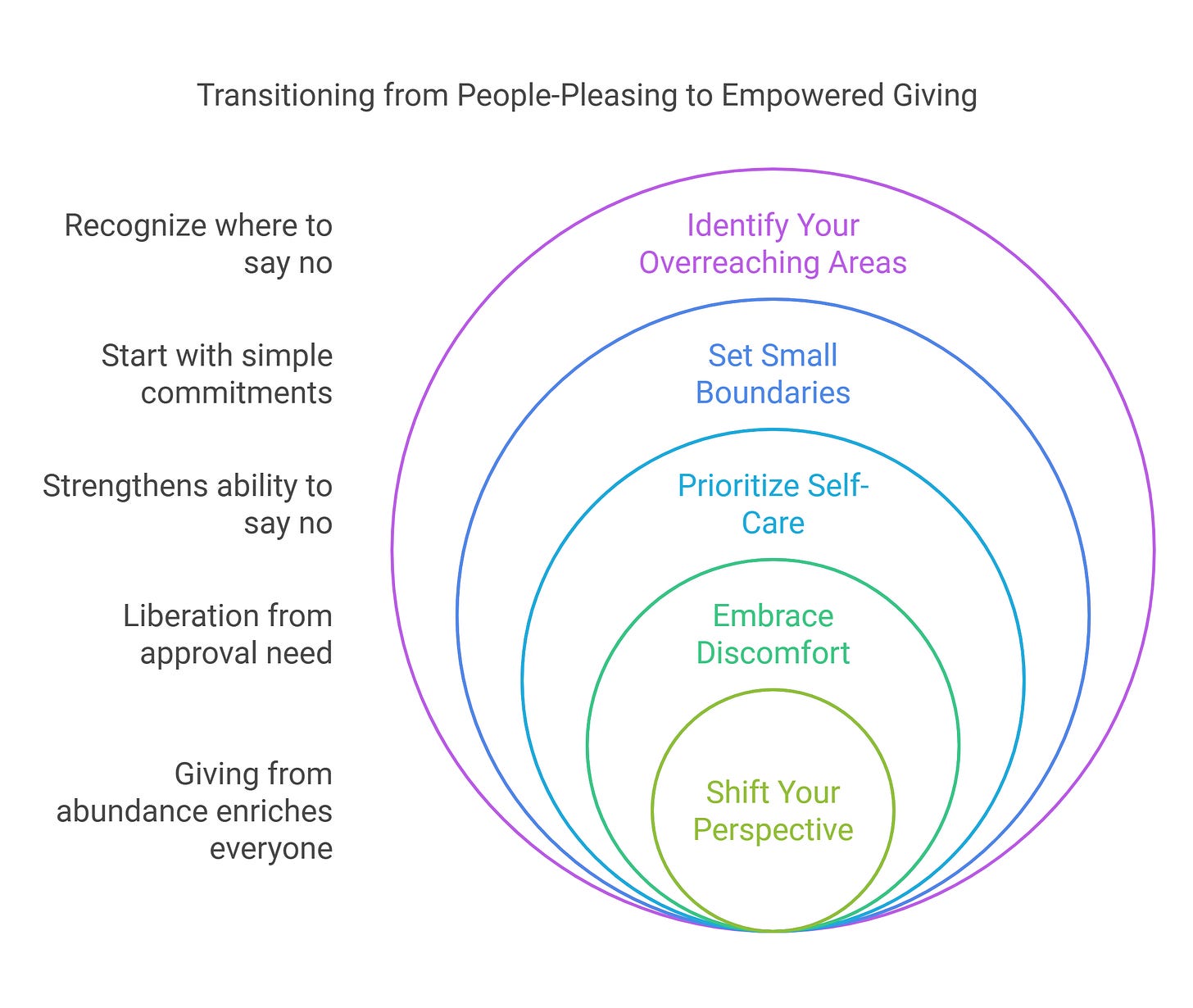Stop Being Nice: The Shocking Science of Why It’s Bad for Your Health
How to move from draining yourself to giving from abundance while protecting your health and self-esteem.
Are You Pleasing People or Truly Giving? Let’s Find Out
Let’s start with a question: Do you find it difficult to say no? Are you the one who’s always bending over backward for everyone – at work, at home, or even with friends? If yes, chances are you’ve fallen into the “people-pleaser” trap. It’s a common dilemma, especially for those of us raised to prioritize others’ happiness above our own.
But here’s the thing: there’s a thin but vital line between being a giver and being a pleaser. Let me break it down for you.
Giver vs. Pleaser: What’s the Difference?
Think of a giver as someone holding a jug full of water. They’re happy to pour water into others’ glasses because their own jug is full. They give from a place of abundance, strength, and intention. Conversely, a pleaser is like someone with a nearly empty jug, trying to scrape out the last drops to fill someone else’s glass. Pleasing comes from a place of scarcity and insecurity.
Giving is intentional, and fulfilling, and leaves both parties enriched. Pleasing, however, often leaves you drained, undervalued, and questioning your worth.
Where Does Pleasing Come From?
Most of us start this habit early, often with good intentions. As children, we’re conditioned to seek approval from parents, teachers, or elders. A simple smile or word of praise made us feel worthy. Over time, this evolves into a pattern of making decisions that prioritize others’ happiness over our own. It’s fine when you’re a kid, but as an adult, it can become a self-esteem killer.
This pattern can feel like second nature, especially for women in their 40s and 50s who’ve spent years giving to their families. But when it tips into constant people-pleasing, it’s time to pause and reassess.
The Biochemical Impact of People-Pleasing
When you constantly try to please others at your own expense, your body responds as though you’re under stress. Here’s what happens:
Chronic Stress Response: Your brain perceives the pressure to meet others’ expectations as a threat. This activates the hypothalamic-pituitary-adrenal (HPA) axis, which releases cortisol (the stress hormone) into your bloodstream.
Elevated Cortisol Levels: While cortisol is essential for short-term stress responses, chronic elevation can lead to serious health issues like weight gain, high blood pressure, and weakened immunity.
Adrenal Fatigue: Constant stress from people-pleasing can overwork your adrenal glands, leaving you feeling fatigued, irritable, and emotionally drained.
Imbalanced Neurotransmitters: Excessive stress reduces serotonin and dopamine levels, the "feel-good" chemicals, leading to anxiety, depression, and a general sense of dissatisfaction.
Increased Inflammation: Chronic stress promotes inflammation in the body, which is linked to conditions like heart disease, diabetes, and autoimmune disorders.
How It Affects Health Clinically
Mental Health Decline: Anxiety, depression, and burnout are common among chronic people-pleasers.
Sleep Disturbances: Constantly overthinking and worrying about others’ opinions can lead to insomnia or restless sleep.
Physical Symptoms: Chronic stress manifests physically as headaches, digestive issues, muscle tension, or even chest pain.
Lowered Immunity: Frequent colds, infections, or slower recovery times are signs of a weakened immune system due to prolonged stress.
The Cost of Pleasing
Here’s a truth that hits hard: pleasing comes at your expense. It can erode your self-esteem, elevate your stress levels, and even harm your health. Think about it: when you’re always saying yes to everyone else, how much time or energy do you have left for yourself?
It’s like trying to run a marathon on an empty stomach. Your body, mind, and soul need nourishment, too. When you neglect that, you risk burnout, frustration, and even resentment towards those you’re trying to please.
The Transition: From Pleaser to Giver
Now, here’s the good news: you don’t have to stop caring. You don’t have to turn into a taker who only looks out for themselves. The shift is about boundaries. It’s about knowing when to say yes and when to say no.
Think of yourself as a smartphone. If you’re always running on low battery, how effective can you be? Taking time to recharge doesn’t make you selfish – it makes you sustainable.
Steps to Break Free from Pleasing
Identify Your Overreaching Areas: Where are you saying yes when you really mean no? Write them down.
Set Small Boundaries: Start with something simple. For example, instead of saying, “I’ll take care of it,” say, “I’ll see if I can help.”
Prioritize Self-Care: Get your health in order. When you’re physically and mentally strong, saying no becomes easier.
Embrace Discomfort: Not everyone will like your new boundaries. That’s okay. Letting go of the need for approval is liberating.
Shift Your Perspective: Remember, giving from abundance enriches everyone involved. Pleasing from weakness benefits no one.
Your Takeaway
The world needs more givers – not people-pleasers. Pleasing drains you, but giving fills you up. The next time you feel that tug to say yes to everything and everyone, ask yourself: “Am I giving because I want to, or because I feel I have to?”
The journey from pleaser to giver isn’t about becoming selfish. It’s about reclaiming your strength, finding balance, and showing up for yourself first so you can truly show up for others. Start small, take those steps, and watch your confidence soar. After all, you can’t pour from an empty jug.



